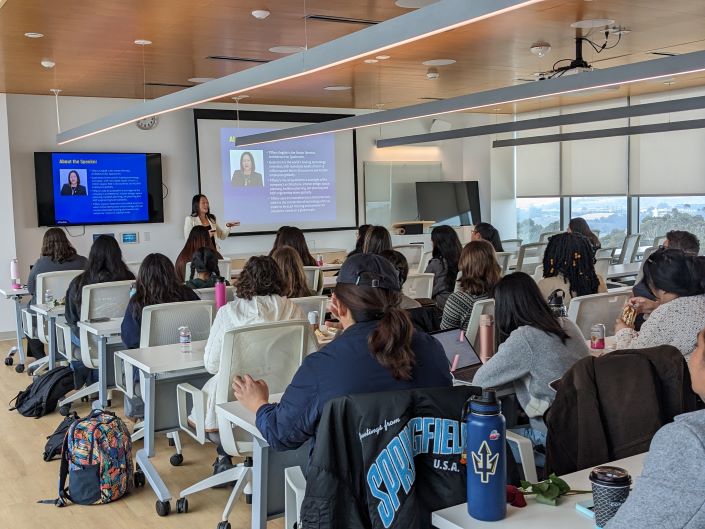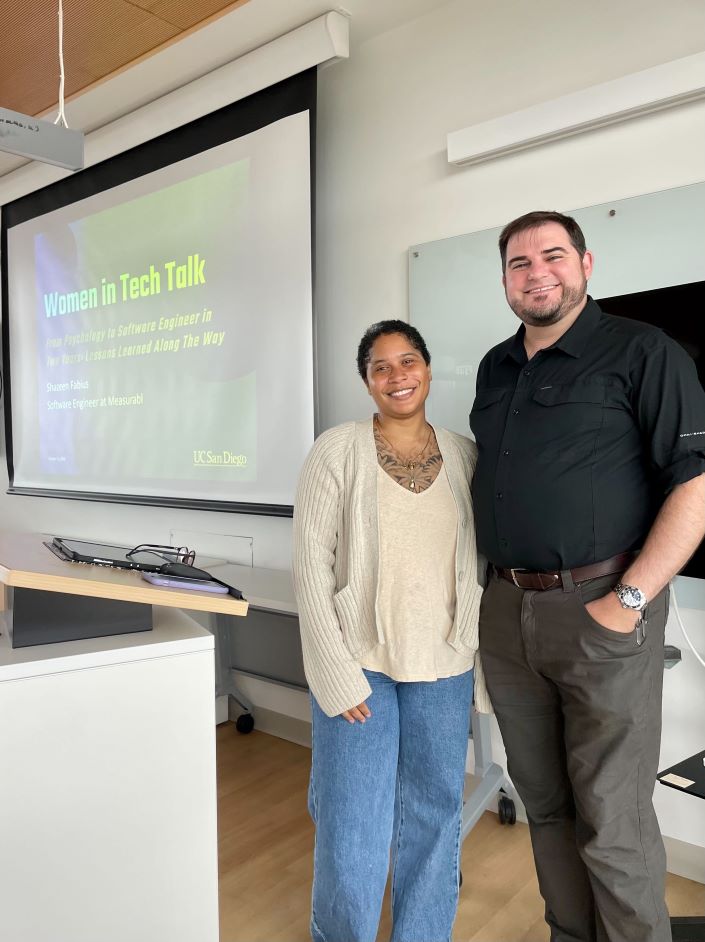Code and Community: Computational Social Science Program Addresses Social Questions with Data
Published Date
Story by:
Media contact:
Topics covered:
Share This:
Article Content
At first glance, climate change denial in California, Ukrainian poetry and the social networks of school children seem nothing like each other. Their common link? The computational methods used to analyze them. They are also examples of student research projects in Computational Social Science (CSS), a program spanning the social sciences that applies computational methods to social questions.
UC San Diego is now offering a one-year master of science degree in CSS, as well as a PhD specialization and a minor for interested students.
Lilly Amirjavadi earned a bachelor’s degree in political science from UC San Diego and is now a student in the CSS master’s program.
“For my capstone project, I’m working with Professor Umberto Mignozzetti and two other CSS students to create a machine learning tool that uses deep neural networks. We’ve been developing this algorithm that uses multilevel regression and poststratification to analyze national survey data in order to predict the political preferences of specific social groups.”
Amirjavadi also noted that similar techniques are often applied to public health data, voting patterns and public opinion surveys.
CSS connects quantitatively-minded scholars from throughout the School of Social Sciences – departments ranging from linguistics to political science and anthropology to urban studies and planning. Will Styler, the CSS program director and a linguistics professor at UC San Diego, explained that CSS creates a space where scholars can address social issues with hard data rather than solely focusing on topics like improving the efficiency of computational methods, developing hardware or crunching numbers
CSS revolves around questions, and the shared methods used to answer them. A cognitive scientist might focus on decision-making and an economist on ecosystem valuation, but they’d use similar data analysis techniques, models, programs, and code.
“If you put five CSS faculty in a room, you’ll get six opinions on what it is,” quipped Styler. “We’re all social scientists: we have questions about the way humans interact with the world and with each other and how we communicate. What we all have in common is a set of methodologies, worldviews and approaches to data analysis.”
Mignozzetti, an assistant teaching professor jointly appointed with CSS and political science, added: “CSS provides a caring way for a social science-oriented student to thrive while learning about computation. I highly recommend it to anyone afraid of computers who wants to dive deeper into quantitative methods and conquer their fear.”
Making progress on a master’s degree
The CSS master’s degree program launched in Fall 2022 and spans a full calendar year. The year kicks off in July with a 10-week intensive bootcamp, where students dive into data-driven causal inference and subtopics of the CSS realm. Throughout the rest of the year, students also study statistical computing, machine learning for the social sciences, geographic information systems (GIS), time series analysis, and more with large amounts of flexibility that allow them to specialize in their areas of interest.
They cap off the year with a final capstone project on a topic chosen from faculty and community-submitted projects—natural language processing (NLP), eviction policy, energy pricing and more—that culminates in a research paper and presentation. The program’s second cohort started in July 2023 and numbers 12 students—75% of whom identify as women.
“Our master’s program addresses a market that’s often unaddressed in the social science computing world,” Styler said, adding that a lot of students who graduate with an undergraduate social sciences degree might not have all the quantitative methods they want. “People come in wanting to level up their computing side but with a strong social sciences background, or wanting to retool their career and get the skills they need to answer the questions they’re asking and be more competitive on the job market.”
The CSS program prepared Andrew Lona ‘23 for his current role as a Technical Information Specialist at the Library of Congress, where he analyzes government data using machine learning and optical character recognition (OCR) pipelines to process documents. Lona studied sociology, law and society, though he briefly studied computer science and engineering at UC Merced before transferring to UC San Diego.
Lona explained he “always craved pursuing data science and machine learning,” but couldn’t tear himself away from his roots in sociology, policy, education, and linguistics. Lona ultimately landed in the CSS program to bridge his passions and further his analytical capabilities. He explained that his capstone project, where he worked with the Homelessness Hub (a research entity in the Department of Urban Studies and Planning) to investigate changes in eviction rates before, during, and after the pandemic, was particularly critical.
“My project really pushed me to master data-wrangling tools, R [a programming language] and ArcGIS,” Lona said. “And, I owe a lot to my mentors Jennifer Nations, Julie Wartell and Isaac Martin for their guidance and patience with me. I still use a lot of methods I picked up from them!”

Integrating CSS into other degrees
PhD students in social sciences also have the option to add a CSS specialization to their degree pre-candidacy, allowing them to supplement the curricula of their home field with technical methods. Enrollment in the specialization is steadily growing; applicants mainly stem from political science, sociology, and linguistics, though aren’t exclusive to the disciplines.
Catherine Arnett, a PhD candidate in linguistics, added a concentration in CSS to her doctoral degree to further aid her research. Her dissertation research focuses on a grammatical construction in Mandarin Chinese called reduplication, which consists of repeating a word to alter its meaning; Arnett is currently building a large corpus of several million examples of reduplication in Mandarin that she plans to analyze. With Ben Bergen’s lab, Arnett also researches how multilingual Large Language Models like GPT-4 process language data.
“I wanted to add the CSS specialization to better communicate to future employers and collaborators what my degree actually entails,” Arnett said, noting that many people outside of linguistics don’t really understand what linguists do. “The program courses also meshed well with my interests and has let me build connections with other PhD students from across the social sciences ranging from economics to political science.”
Undergraduate students also have the opportunity to add a minor in CSS to their degree, where they’re required to take three core CSS courses and four technical electives from across the social sciences. Some possible elective courses include cyber-archaeology, urban data science and social cognition. A new course taught by Mignozzetti will launch in Spring 2024 that focuses on environmental data sciences.
Questions about creativity, culture, behavior and human practices are where AI is still weak. That’s what we do at CSS; we give our students the tools to work with any program to answer these uniquely human questions that AI can’t answer, and which have immense impacts on our day-to-day lives.
Building community and computation skills
Amirjavadi appreciates the diversity of the CSS master’s program and the community she’s found there.
“Something I’ve really loved about the program is that everyone comes in with such different backgrounds and skill sets,” Amirjavadi explained. “Some people might see us as not being on the same page, but I’ve always seen it as an advantage because we can all help each other out. If you’re not really familiar with a particular area of social science or a certain coding language, someone in the program probably is and they can help you learn about it.”
Amirjavadi graduated with a bachelor of arts in political science and a minor in CSS in June 2023. She considered several possible paths for graduate school, and the CSS master’s program’s focus on technical skills ultimately won out. She added, “Working on such a quantitative project throughout the entire year has been a great way to practice and improve my hard data science skills like coding, debugging and analytics.”
Tech fields can often feel unwelcoming to minorities, women and gender-diverse individuals. The CSS program aims to change that.
“We like to think of CSS as a friendly path to entering the tech world that’s centered on questions,” Styler explained, adding that one of the goals of the program is to increase inclusivity in tech- and data-centered spaces, both in relation to diversity and academic background. “For those who have lived complex lives in complex social structures, asking questions comes naturally. We really want to bring in students who might not traditionally enter tech.”
Women outnumber men enrolled in the program at every level, a stat largely uncommon in tech-focused spaces.The program also attracted donors to its mission. For instance, the Women in Tech project, sponsored by alumna Shelley O'Connor and the Morgan Stanley Foundation, aims to bring women in high-ranking positions of tech companies to chat with students every quarter about their journey to tech. The Women in Tech program also works with CREATE to encourage a pipeline of girls in K-12 schools to become excited and engaged in STEM education and activities.
Looking forward
The master’s program accepts applications through March each year. Interested applicants can apply here or contact the CSS advising department. As an added bonus for international students, CSS federally qualifies as a STEM field; international students in the CSS master’s program are eligible for up to three years of optional practical training in the United States after completing the program without a change to their visa status. PhD students interested in the specialization can learn more here, and undergraduates can add the minor on the TritonLink portal.
As for why you should apply? CSS is future-proof, and grounded in questioning what makes us human, Styler said.
“We’re in a place right now where generative AI is creating a lot of code and is doing it well,” Styler explained, noting that it is particularly adept at writing code for data analysis. “This makes our focus on questions so much more important—questions about creativity, culture, behavior and human practices are where AI is still weak. That’s what we do at CSS; we give our students the tools to work with any program to answer these uniquely human questions that AI can’t answer, and which have immense impacts on our day-to-day lives.”

You May Also Like
UC San Diego is Strengthening U.S. Semiconductor Innovation and Workforce Development
Technology & EngineeringStay in the Know
Keep up with all the latest from UC San Diego. Subscribe to the newsletter today.




